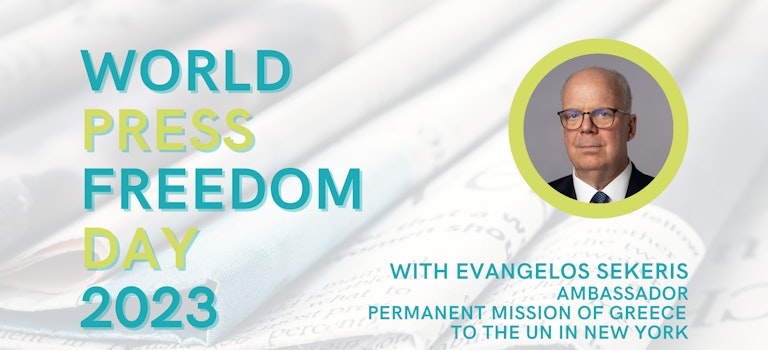On World Press Freedom Day, Ambassador Evangelos Sekeris of Greece to the United Nations in New York shared his work on the protection of women journalists.
Today, 3 May is World Press Freedom Day. As an International Gender Champion, you committed:
“I will promote the protection of women journalists and media workers, as Greece is one of the countries that promote the biennial United Nations General Assembly resolution on the safety of journalists and the issue of impunity; advocate for stronger language in the agreed conclusions of Commission on the Status of Women and host a high-level event to bring attention to the issue.”
Why is it important to consider women specifically regarding freedom of the press?
The need to protect and strengthen gender equality is an essential component of inclusive, democratic, and peaceful societies. However, gender-based physical, emotional and psychological violence is one of the most widespread and persistent human rights violations in our world today and one of the most pervasive forms of gender-based inequality.
Women journalists bear a disproportionate burden of being exposed to hate speech and hate crimes, often experiencing online harassment and abuse, threats, and acts of physical or sexual violence.
Gendered hate speech and violence, whether in the real or virtual world, can have detrimental effects on the safety of women journalists because they may result in self-censorship and, at times, in physical or sexual assaults, or even murder.
Against this backdrop, silence is not an option. Impunity for crimes against women journalists, especially those committed in times of conflict, must be adequately addressed. A gender perspective on peace-related initiatives should also aim at enhancing their safety.
How are you working towards the goal of freedom and protection for women journalists?
Being one of the Co-Chairs of the UN Group of Friends for the Protection of Journalists, Greece is the penholder of the biennial Resolution on the “Safety of Journalists and the Issue of Impunity”. In November 2021 the Resolution (A/RES/76/173) was co-sponsored by 112 out of 193 UN Member States and includes a gender perspective, inter alia by:
- Condemning attacks on women journalists and media workers, such as all forms of sexual and gender-based discrimination and violence, including online and offline sexual harassment, intimidation and incitement to hatred against women journalists, as well as by
- Calling upon states to take a gender-responsive approach to the protection of journalists and media workers and to combating impunity.
Also, Greece recently launched the Task Force on Ensuring the Protection, Safety and Enhancement of the Status of Journalists and Media Professionals. This inclusive national coordination mechanism aims at strengthening, nationally as well as internationally, the status of women journalists and of those who report on gender equality issues.
Moreover, for the first time in the history of the Commission on the Status of Women, the Agreed Conclusions in 2022 had three references to women journalists and media workers, including a standalone paragraph. This language had been pushed by the EU for years. The text recognises the role of journalists and the need to create an enabling environment for them. This is a major step. Greece has been a fervent supporter of this development, as one of the countries that promote the biennial UNGA resolution on the safety of journalists.
What can other International Gender Champions in permanent missions, international organisations, and civil society do to promote freedom of the press and protection of women journalists?
Gender equality is rightly at the heart of the 2030 Agenda. Empowering women and girls and strengthening gender equality can help transform vicious circles into virtuous ones, supporting inclusive societies, sustainable peace and development, decent work and employment.
Having said that, as the Special Rapporteur on Violence Against Women stresses, let’s not forget that the “world of work” for women journalists – especially those who cover conflicts - extends beyond the traditional workplace.
Investing in the potential of women peacebuilders, human rights defenders, local civil society leaders and journalists is the right path towards peace, security and development so that no one is left behind.
